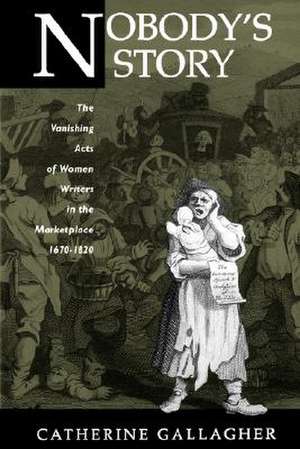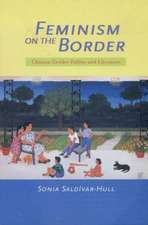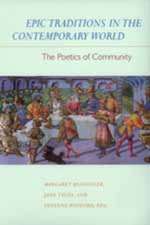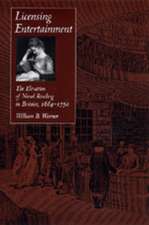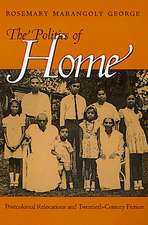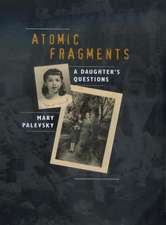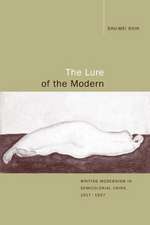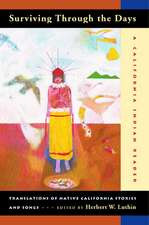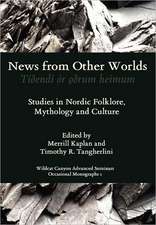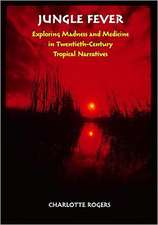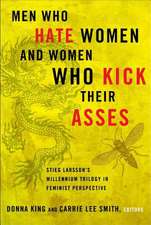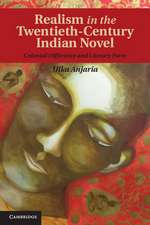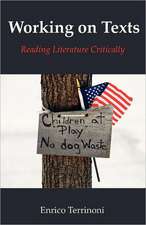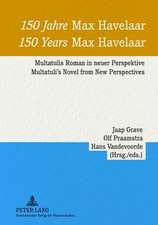Nobody′s Story – The Vanishing Acts of Women Writers in the Marketplace 1670–1820: The New Historicism: Studies in Cultural Poetics
Autor C Gallagheren Limba Engleză Paperback – 16 iun 2011
Gallagher analyzes the provocative plays of Aphra Behn, the scandalous court chronicles of Delarivier Manley, the properly fictional nobodies of Charlotte Lennox and Frances Burney, and finally Maria Edgeworth's attempts in the late eighteenth century to reform the unruly genre of the novel.
Din seria The New Historicism: Studies in Cultural Poetics
-
 Preț: 235.48 lei
Preț: 235.48 lei -
 Preț: 220.45 lei
Preț: 220.45 lei -
 Preț: 298.22 lei
Preț: 298.22 lei -
 Preț: 269.19 lei
Preț: 269.19 lei -
 Preț: 267.28 lei
Preț: 267.28 lei -
 Preț: 237.17 lei
Preț: 237.17 lei -
 Preț: 325.75 lei
Preț: 325.75 lei -
 Preț: 247.30 lei
Preț: 247.30 lei -
 Preț: 496.29 lei
Preț: 496.29 lei -
 Preț: 320.58 lei
Preț: 320.58 lei -
 Preț: 306.16 lei
Preț: 306.16 lei -
 Preț: 309.96 lei
Preț: 309.96 lei -
 Preț: 399.02 lei
Preț: 399.02 lei -
 Preț: 313.07 lei
Preț: 313.07 lei -
 Preț: 306.71 lei
Preț: 306.71 lei -
 Preț: 316.71 lei
Preț: 316.71 lei -
 Preț: 251.16 lei
Preț: 251.16 lei -
 Preț: 319.05 lei
Preț: 319.05 lei -
 Preț: 310.73 lei
Preț: 310.73 lei -
 Preț: 312.86 lei
Preț: 312.86 lei -
 Preț: 312.86 lei
Preț: 312.86 lei -
 Preț: 393.08 lei
Preț: 393.08 lei - 23%
 Preț: 563.08 lei
Preț: 563.08 lei -
 Preț: 443.64 lei
Preț: 443.64 lei - 23%
 Preț: 560.10 lei
Preț: 560.10 lei - 23%
 Preț: 567.05 lei
Preț: 567.05 lei - 23%
 Preț: 556.41 lei
Preț: 556.41 lei
Preț: 282.32 lei
Nou
Puncte Express: 423
Preț estimativ în valută:
54.02€ • 56.55$ • 44.96£
54.02€ • 56.55$ • 44.96£
Carte tipărită la comandă
Livrare economică 31 martie-14 aprilie
Preluare comenzi: 021 569.72.76
Specificații
ISBN-13: 9780520203389
ISBN-10: 0520203380
Pagini: 339
Dimensiuni: 157 x 229 x 22 mm
Greutate: 0.58 kg
Editura: University of California Press
Seria The New Historicism: Studies in Cultural Poetics
ISBN-10: 0520203380
Pagini: 339
Dimensiuni: 157 x 229 x 22 mm
Greutate: 0.58 kg
Editura: University of California Press
Seria The New Historicism: Studies in Cultural Poetics
Descriere
Exploring the careers of five influential women writers of the Restoration and eighteenth century, this book reveals the connections between the increasing prestige of female authorship, the economy of credit and debt, and the rise of the novel.
